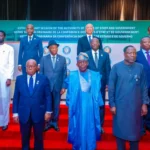Formed in 1975 with the goal of fostering economic integration and political stability among its member states, the Economic Community of West African States (ECOWAS) has historically played a vital role in maintaining order and safeguarding democracy in West Africa. Throughout its existence, ECOWAS has actively engaged in various military interventions across the region, aiming to address conflicts and uphold peace.
One of its major peacekeeping efforts occurred in 1990 when it intervened militarily in Liberia in response to the escalating violence perpetrated by various warring factions, particularly Charles Taylor’s National Patriotic Front of Liberia (NPFL) and other rebel groups. Despite initial challenges faced by ECOMOG forces in effectively containing the conflict, their presence helped stabilise certain areas and facilitate humanitarian assistance.
In addition to its intervention in Liberia, ECOWAS played a crucial role in containing the violence and facilitating peace negotiations in Sierra Leone. The intervention, spearheaded by ECOMOG forces, consisted of troops from various West African countries, including Nigeria, Ghana, and Guinea. Together with the Sierra Leonean government forces, ECOMOG worked tirelessly to combat rebel groups and restore order in the country. This conflict ended with the disarmament and demobilisation of rebel fighters by ECOMOG, which provided security and logistical support for peace negotiations, including the Lomé Peace Accord signed in 1999. This accord aimed to end the conflict and pave the way for national reconciliation.
In January 2024, Burkina Faso, Niger, and Mali jointly announced their withdrawal from the bloc, citing overly punitive sanctions. Despite this, the commission later released a statement reaffirming its commitment to peace in the region and expressing an interest in continued negotiation, despite reaching a political impasse.
As of today, ECOWAS finds itself with five of its 15 member states suspended: Mali, Sierra Leone, Burkina Faso, Guinea, and Niger. All these coups have occurred over the last three years, signaling an alarming trend that has heightened concerns about a potential return to military rule in the region. This challenges the union’s efforts at ensuring democracy in the region. Military coups represent a direct assault on democratic principles and the rule of law. By overthrowing elected governments and imposing authoritarian rule, military juntas undermine the legitimacy of democratic institutions and deny citizens their fundamental rights and freedoms.
Tolerating military takeovers in Mali or elsewhere in West Africa sets a dangerous precedent that weakens democratic norms and institutions, making it harder for countries to transition to or sustain democratic governance.
Accepting military rule in Mali or elsewhere condones such violations and perpetuates a culture of impunity, undercutting efforts to promote human rights and social justice. ECOWAS has a responsibility to uphold the universal principles of human rights and condemn any action that infringes upon the dignity and well-being of individuals in the region.
Furthermore, ECOWAS’s credibility and legitimacy as a regional organisation committed to democratic governance are at stake when it tolerates military takeovers. Upholding democratic norms and condemning unconstitutional changes of government strengthens ECOWAS’s moral authority and enhances its ability to engage with international partners. By consistently upholding democratic principles, ECOWAS can exert a positive influence on regional dynamics and promote peace, stability, and prosperity in West Africa.
While democracy as a system of governance is not without its flaws, such as the potential for the majority to oppress the minority and the challenges posed by decentralized power structures, it remains the best system for ensuring accountability of the state to its people. Despite its imperfections, democracy offers numerous advantages over authoritarian regimes or other forms of government, including opportunities for citizen participation, freedom of expression, and the protection of minority rights. Moreover, democracy allows for the peaceful resolution of conflicts through dialogue, compromise, and adherence to the rule of law.
It’s crucial to recognise that the state and government should reflect the ethics and values of the people they serve. Development is not a linear process but a combination of purposeful decision-making that leverages the specific cultural context of a society in areas such as investment, infrastructure development, education, and innovation. In this context, democracy remains a vital tool for ensuring that the voices and needs of the populace are heard and addressed.
If one wishes to gauge the Commission’s attitude towards its former members, one only needs to observe how its most significant members choose to engage with them. In March of this year, Nigeria’s customs reopened the border to Niger, enabling the resumption of open trade between the two nations. Given Nigeria’s status as a leading member of the ECOWAS commission, it is safe to say that the commission’s approach to the suspended member is decidedly conciliatory.
While maintaining an open dialogue for negotiations between member states is important, the Commission runs the risk of appearing toothless to other would-be coup plotters in the region. If West Africa is to progress as a unified union, it must do far more to cultivate a pan-African identity; otherwise, it may soon find itself becoming a peacekeeping union in name only.
Ibrahim resides in Abuja

 Join Daily Trust WhatsApp Community For Quick Access To News and Happenings Around You.
Join Daily Trust WhatsApp Community For Quick Access To News and Happenings Around You.

